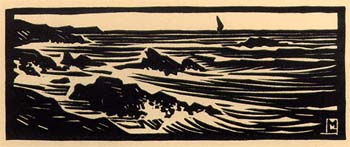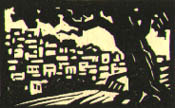

| "De tout ce que nous pouvons déterminer de bien par le verbe, par l'écrit, rien ne vaut l'Exemple personnel donné par le plus humble de nous dans le plus humble coin." |

 ITH this profound sentiment which his elder brother, Elie, the worthy patriarch of the Reclus lineage, the founder of souls, has left us, the entire life of Elisée will be found in equal harmony.
ITH this profound sentiment which his elder brother, Elie, the worthy patriarch of the Reclus lineage, the founder of souls, has left us, the entire life of Elisée will be found in equal harmony.![]()
In effect, baffling as will remain for a portion of our human forces the vastness of the work accomplished by him who until his last breath never yielded to idleness, however great our admiration for the power of such a brain, the accumulation of so much acquired science,- his starry spirit soars higher, higher still in its radiations of simplicity, abnegation and kindness, together with an incoercible energy, and indefatigable will toward the eternal Best...
It is before the Council of War of St. Germain,--dragoons passing sentence upon this thinker--that we once more meet Elisée in his impassive serenity, head higher than ever, throat offering itself as heretofore to the bullets, disdaining to defend himself, resenting, rejecting all paliation all strained mitigation: a Christ before the pretorium.![]()
It is truly necessary for us to come and testify to this, to acclaim the grandeur of him who "slender, in the simple jacket of a fédéré, dominated, overwhelmed by a hundred cubits, the Pilate, constrained to 'condemn' him!"![]()
Inseparable were these two first-born of the generous and branching tree whose every scion put forth in its own individual direction,--what was formerly called: a blessed family--both always courageously united in the same tenderness as twins in the same inflexibility of virtue, both applied the same, touching ingenuity in effacing themselves under the supposed superiority of the other--the universal geographer deferring to the gentle and profound master of irony, the peerless iconoclast at the sport of massacring our successive mythologies- he who wrote the Primitive Folk, and other exquisite pages, deferring to the author of L'Homme et la Terre.![]()
As soon as his eyes were opened to the light, Elisée saw no thing more in the grave, that "horizontal door," than a poetic propitiatory of Christian egotism, half-opened toward a heaven of future recompenses, regulated by men cowered with all need of fearing hell.
Neither did he adhere to the sanctified task-work of a conditional goodness, to the bonded investments of an usurious charity. His aspirations urged him higher, and in quite another manner: Through Good alone, through the inevitable enjoyment of accomplished Good, he found himself more than compensated, and taking his love of the Good into account, and his love of truth, what ideal is there superior? . . . ![]()
But even though he recognized the sincerity of certain sensitive hearts, and even superior spirits in annihilating themselves, perinde ac cadaver under the credo quia absurdum of a legend they asserted to be a revelation,- to whom, through whom?- and of a cosmogony by far too droll, exalting themselves to a pitch which they themselves termed "the frenzy of faith," devourers of religion, destroyers through excess of love, and charging us to begin, like themselves, by putting out our eyes in order to see clearly, he will only remain the more implacable to the theist imposture, directly fomented for the sole advantage of all the political and economical exploitation of all parasitisms. He will only the more absolutely repudiate the hypothesis of an entity of entire goodness, power,prescience- (without which no God!)- whose perverse wickedness could have created sorrow for those who did not ask him to be born, making us purchase Life by Death, and instituting that law of mutual massacre under which everything devours everything else, there not even being a tree which should not suffocate its neighbour, a God, who as a final refinement of diabolical mockery, could have granted us a free will which he knew beforehand must turn against us.![]()
To this abominable God, the God who slays, whom they even dare glorify as the "God of battle," the crime of crimes above everything else which Elisée could not pardon, was the juggling during so long a succession of centuries, the juggling with our deliverance by the honeyed treachery of this Resignation, solely, beneath its air of benignity, conceived in order to annihilate our supreme recourse: Revolt. ![]()
Worn out by the study of transmutations indefinitely carried on by primary organisms through the sequence of ages, whose genius as well as whose terminus eludes our grasp, like the measurement of space, Elisée did not see anything but the universal, uninterrupted progression of beings and of things. ![]()
At such an altitude the glance travels far, and outstrips the clock which marks the hours. Soon, with the certain vision that universal peace cannot and will not be accomplished after all, except under the irresistible urge of the proletariat whose gift of advent it will be, the consequent synthesis of our formula of yesterday was affirmed in the eyes of our prophet: "Liberty, Equality, Fraternity"--in a single word: SOLIDARITY, which is COLLECTIVITY.
The last step is made: Syllogistically, peremptorily, Elisée joined the ranks of what to the dismay of a number of good souls who are frightened by words, is called Anarchism. Who, in effect, if his pretended level of Equality and his refrain of Liberty and Fraternity be not an imposture and a snare, can arrogate to himself the right of commanding him who refuses to command any person, whose dignity and conscience forbid obedience?...![]()
The pharisaical interest of our capitalist regime demands of it from the very first to disaffect, to degrade from its etymology the noble word Anarchism in order to deprave it, make it a symbol of confusion and irregularity... But without pausing, Elisée always marched forward. And his faith in the future, his imperturbable certainty in ever-improving tomorrows gave him an optimism indomitable and joyous, a gracious relief by which all who approached him profited...![]()
In the childlike purity of his soul, he likewise possessed a childlike innocence, a perpetual gladness, and apropos of trifles whose meanings escaped us, he would burst out into endless volleys of mad laughter. On the other hand, irresponsive to the Gallic wit of Rabelais or of Beroalde, he froze up at the least indecorous or equivocal discourse....
Sobre to abstinence, with an invincible aversion from all fermented drink, he felt the pious respect of the Hindoo for even the lowliest of creatures. A vegetarian by instinct, thru that ancient horror of all murder, he never failed to observe, although omitting to speak of the original comparative length of the intestine, that our dental system incontestably classes us furthest away from the carnivorous animals, man not even being provided with the canine teeth of the last, dog-faced ape, which lives only on grains and fruits.![]()
And it was never his intention to accept, in aubaine of the interests of gluttony the compromise which would impose upon us an agglomoration of our cities, "where we breathe, like idiots, the air exhaled by our neighbour, where we are reduced to superpose our very carrion, instead of living in the pure well-being of our strength and liberty."![]()
His gentleness, inexhaustible as it was, could scarcely pardon the solicitude of his family the pious fraud which attempted to surreptitiously bolster up his last, exhausted forces....![]()
During the 75 years of that courageous life, not a gesture which fell short of human communion, not a breath which was not disdainfully indifferent to all that is acquired or possessed- and always he was simple and modest....![]()
He had taken lodgings at Sévres.
A journal had just informed me that thieves had looted his library in his absence.
He comes to us, as usual, in his best humor.
"My poor, dear friend! Your books. .
"Well! What of my books? I read all that they had to say to me, and now they are going to be of use to others."
But undoubtedly I did not appear to him to be sufficiently exalted. Then dwelling still upon the notice:--
"Moreover, since I did not give them, they did well to take them." And smiling all the while, he rubbed his hands briskly in a downward direction--his usual sign of entire good humor....![]()
Of this more than philosophical detachment and in many other incidents of the same kind, I cannot help recalling one about that other, his elder brother Elie--. . .
His trousers had been, by too long wearing, brought to such a point of delapidation, that Mme Elie resolutely decided on and accomplished the purchase of a new pair.![]()
Then, in order to forestall resistance, setting out to buy provisions, Madame this time demanded that they change session. The good man complied, submitting to authority.![]()
But on returning from market, what a surprise awaited her! Her husband had put on his old trousers again. Madame exclaimed!--
"Don't be angry," said Elie, "the poor old man of last week has returned, and his breeches were in such a state that his flesh could be seen through the holes. So then . . ."
"At least, couldn't you have given him the other pair?"
"Then, that which was not good enough for me should have done for another poorer than we are? And it is you who tell me this? Oh, Noémie!"...
"You are right, my dear, I was wrong." . As if by magic, this clarity of soul [of Elisée Reclus] which instantly endowed the radiance of his glance, this quickening glory of justice, kindness above all,- I always must recur to his kindness- this simplicity, in such grandeur, seemed immediately to illumine, to enhance the entire little house:
"Doesn't it seem to you that everything here has become better since M. Elisée has come?" A very dear child asked us this, a soul, worthy, if that could be, to be elevated to that other spirit.- And it was true....
And better than any hermit or stylite, was not he truly the saint of saints, who, not needing it, was able so well to dispense with everything suggestive of Bon Dieu?
Elisée died, as he had lived, through his heart.
He has given us, and we will keep, the most elevated, the best of the sentiments of humanity, love in respect:- Admiration.
| "LES TEMPS NOUVEAUX" Supplement. No. 33, DEC. 1905. | NADAR |
